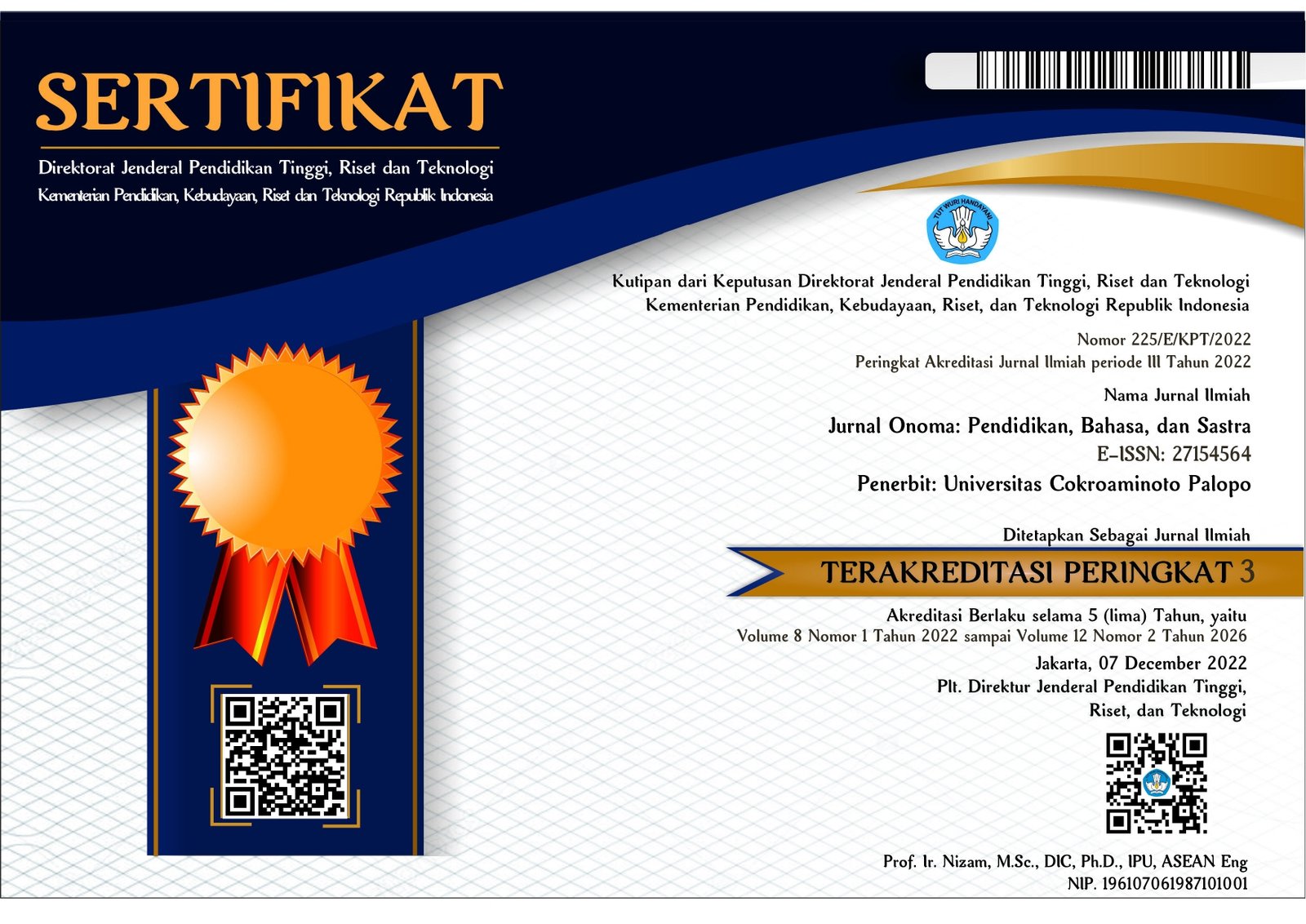Kemampuan Menyimak Berita Melalui Model Pembelajaran Giving Question And Getting Answer Siswa Kelas VIII SMPN Satap 13 Kolaka Utara
https://doi.org/10.30605/onoma.v7i1.1446
Keywords:
Giving question and getting answer: Menyimak beritaAbstract
Penelitian ini bertujuan mendeskripsikan Kemampuan Menyimak Berita melalui Model Pembelajaran Giving Question and Getting Answer Siswa Kelas VII SMPN Satu Atap 13 Kolaka Utara. Penelitian ini merupakan penelitian kuantitatif. Penelitian ini didesain secara deskriptif. Sampel pada penelitian ini, yaitu siswa kelas VIII yang ditentukan secara purposive sampling. Teknik pengumpulan data yang dilakukan dalam penelitian ini adalah observasi, tes, dan dokumentasi. Data hasil penelitian ini dianalisis dengan menggunakan analisis statistik deskriptif. Hasil penelitian menunjukkan bahwa nilai rata-rata pretest yang diperoleh siswa kelas VIII SMPN Satu Atap 13 Kolaka Utara dalam menyimak berita, yaitu 77,57, sedangkan nilai rata-rata posttest yang diperoleh siswa kelas VIII SMPN Satu Atap 13 Kolaka Utara dalam menyimak berita, yaitu 85,10. Hasil pencapaian KKM pretest siswa kelas VIII SMPN Satu Atap 13 Kolaka Utara dalam menyimak berita yang mendapat nilai 75 ke atas sebanyak 19 sampel (63%), sedangkan hasil pencapaian KKM posttest siswa kelas VIII SMPN Satu Atap 13 Kolaka Utara dalam menyimak berita yang mendapat nilai 75 ke atas sebanyak 24 sampel (80%). Perolehan nilai rata-rata dan hasil pencapaian KKM pretest dan posttest menunjukkan bahwa penggunaan model pembelajaran giving question and getting answer lebih baik dibandingkan dengan tanpa menggunakan model pembelajaran giving question and getting answer dalam menyimak berita siswa kelas VIII SMPN Satu Atap 13 Kolaka Utara. Dengan demikian, dapat dikatakan siswa belum mampu dalam menyimak berita menggunakan model pembelajaran giving question and getting answer karena siswa yang memperoleh nilai 75 ke atas tidak mencapai 85%.
Downloads
References
Arikunto, S.. 2008. Metodologi Penelitian. Bina Akasara. Yogyakarta.
Dhieni, N., dkk. 2008. Metode Pengembangan Bahasa. Universitas Terbuka. Jakarta.
Hamruni. 2011. Strategi Pembelajaran. Insan Madani. Yogyakarta.
Muda, D. I. 2008. Jurnalistik Televisi: Menjadi Reporter Profesional. Remaja Rosdakarya. Bandung.
Rusman. 2010. Model-Model Pembelajaran. Rajawali Pers. Bandung.
Tarigan, H. G.. 2013. Menyimak sebagai Suatu Keterampilan Berbahasa. Angkasa. Bandung.
Tim Pustaka. 2013. Kamus Besar Bahasa Indonesia. Media Pustaka Phoenik. Jakarta.
Zaidi, K. U. & Muchasan, A. 2015. Meningkatkan Prestasi Belajar Siswa melalui Strategi Giving Question and Getting Answer (GQGA) pada Materi Zakat Siswa Kelas VIII MTs Maslahiyah Krecek. Jurnal Inovatif, Volume 1 No. 2: 65.
Downloads
Published
How to Cite
Issue
Section
License
In submitting the manuscript to the journal, the authors certify that:
- They are authorized by their co-authors to enter into these arrangements.
- The work described has not been formally published before, except in the form of an abstract or as part of a published lecture, review, thesis, or overlay journal.
- That it is not under consideration for publication elsewhere,
- That its publication has been approved by all the author(s) and by the responsible authorities – tacitly or explicitly – of the institutes where the work has been carried out.
- They secure the right to reproduce any material that has already been published or copyrighted elsewhere.
- They agree to the following license and copyright agreement.
License and Copyright Agreement
Authors who publish with Onoma Journal: Education, Languages??, and Literature agree to the following terms:
- Authors retain copyright and grant the journal right of first publication with the work simultaneously licensed under Creative Commons Attribution License (CC BY 4.0) that allows others to share the work with an acknowledgment of the work's authorship and initial publication in this journal.
- Authors are able to enter into separate, additional contractual arrangements for the non-exclusive distribution of the journal's published version of the work (e.g., post it to an institutional repository or publish it in a book), with an acknowledgment of its initial publication in this journal.
- Authors are permitted and encouraged to post their work online (e.g., in institutional repositories or on their website) prior to and during the submission process, as it can lead to productive exchanges, as well as earlier and greater citation of published work.

















